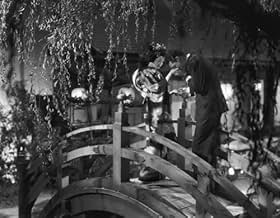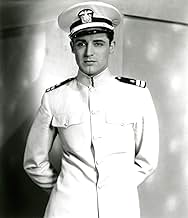Lieutenant Pinkerton marries geisha-in-training but soon after abandons her and goes back to the US.Lieutenant Pinkerton marries geisha-in-training but soon after abandons her and goes back to the US.Lieutenant Pinkerton marries geisha-in-training but soon after abandons her and goes back to the US.
- Awards
- 1 win total
- Bridesmaid
- (uncredited)
Featured reviews
The story is based on the David Belasco play which was then made into a Puccini opera by the same name. The film, however, is not an opera though some of the music from the opera is included as incidental music.
Lt. Pinkerton (Cary Grant) goes out on the town with his navy pal, Lt. Barton (Charlie Ruggles). Soon Pinkerton meets Cho-Cho San (Sylvia Sidney) and he's smitten with her. But he's informed that he cannot date her or spend time with this geisha. Barton sees a loophole and suggests Pinkerton marry her....and then dump her when his ship leaves. She doesn't realize that Pinkerton is a dirty dog and they are married. Soon after the wedding, Pinkerton leaves....and Cho-Cho waits several years for him to return. In the meantime, she's had his child...a child who he doesn't know he has. Later, Pinkerton returns to Japan....with his new American wife!! What's next? Well, it's best I don't spoil it...see the film.
The story is lovingly made and looks great...and it's also quite moving. It is such a darn shame, then, that the casting decisions were so stupid....fine for 1932 but still stupid when you see it today. Part of this problem isn't just because such casting seems racist. It's also that folks in 2020 know a lot more about Japanese culture and know that what they are being given here is less Japan....and a lot more Puccini and Belasco.
Overall, a very good film version but one that begs to be remade. And, I have to knock off a point for Grant's singing...it's among the worst I've ever heard by an actor...even worse than Lee Marvin's singing in "Paint Your Wagon" but thankfully Grant's is confined to only one terrible song....and it's not a musical with multiple numbers!
Like most of Sylvia Sidney's roles in this period, the audience waits for the moment when she breaks down in inconsolable tears over the unworthy B.F. Pinkerton. Gary Cooper had been proposed to play the role. Cooper was too important, and Cary Grant was young, very good-looking, and wouldn't cost the production much in the part; given how much set designer Wiard Ihnen and costume designer Travis Banton were spending, it was a good choice. Grant isn't called to be on screen for that long, and isn't called on to do much in the way of acting; Berton Churchill as the American consulate, offers a far more nuanced performance in about four minutes of screen time.
It's clear why this movie disappeared for decades. With suicide, bigamy and miscegenation in the mix, there was no way to re-release it under the Production Code. Alas, if it's not one thing, it's another; nowadays, its use of yellowface renders it equally problematic. Nonetheless, looking at it through the character's broken English, it's another of Miss Sidney's fine performances in a heartbreaking story, one that convinces me that sentimentality and feminism is a good thing.... at least by late 19th century standards. And the visuals are superb.
Those outraged at the casting of a Jewish/American actress as a geisha should also take note of the fact that All-American cad Pinkerton is played by a Bristolian.
Did you know
- TriviaThe Japanese censor cut a scene where Cary Grant and Sylvia Sidney share an embrace, because Miss Sidney's elbow was exposed.
- GoofsWhen the US Navy returns to Tokyo Bay/Yokohama, mountains are seen rising from the sea. There are no mountains in that area.
- Quotes
Cho-Cho San: Do not weep, Mama-san.
Cho-Cho's mother: But you are so young and never have you been away from home before.
Cho-Cho San: But consider Mama-san, soon I shall be very great geisha and then you and the august grandfather and the little brother will have much money.
Cho-Cho's grandfather: This is no place for the daughter of my son, the daughter of a noble samurai. I should never have consented to your coming here.
Cho-Cho San: But we must live and I'm the only one who can work and help.
Cho-Cho's grandfather: Your father died with honour when he could no longer live with honour.
Cho-Cho San: Is it then so shameful to make people happy? To sing for them, to make music, and dance? And I may make a fine marriage. Then I can buy you many gifts
- ConnectionsReferenced in Jeopardy!: Episode #1.2 (1984)
- How long is Madame Butterfly?Powered by Alexa
Details
- Runtime1 hour 26 minutes
- Color
- Aspect ratio
- 1.37 : 1
Contribute to this page


































